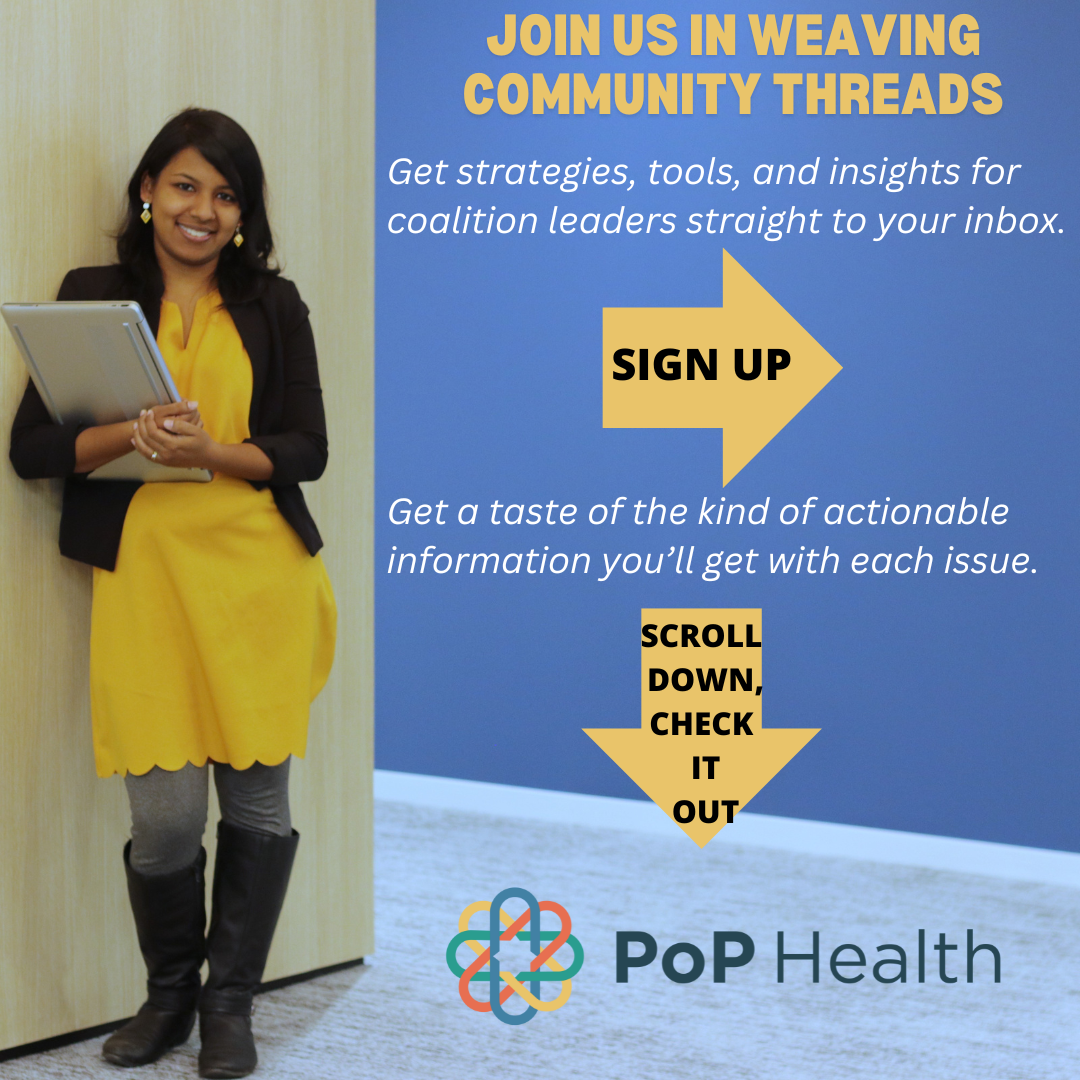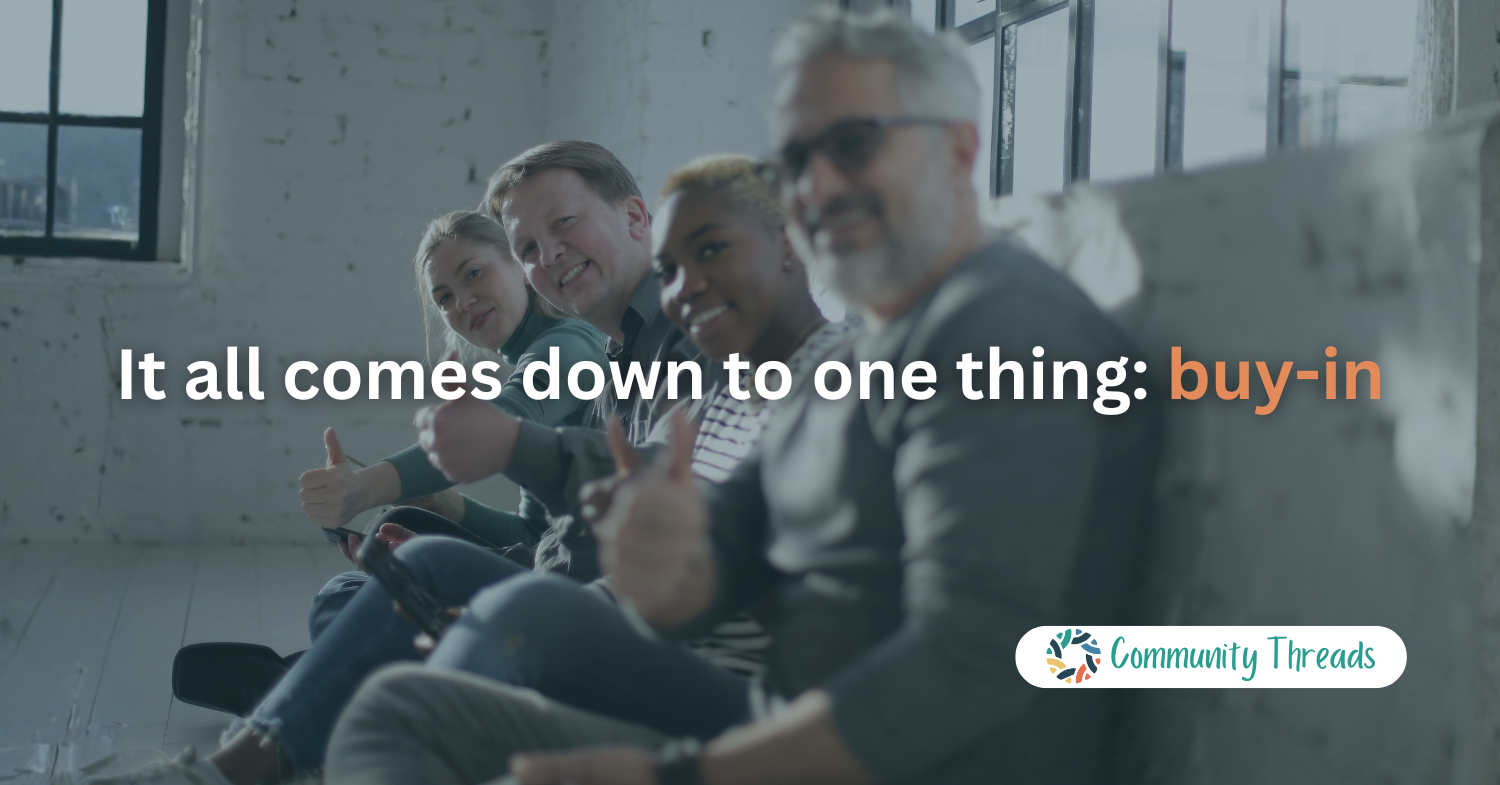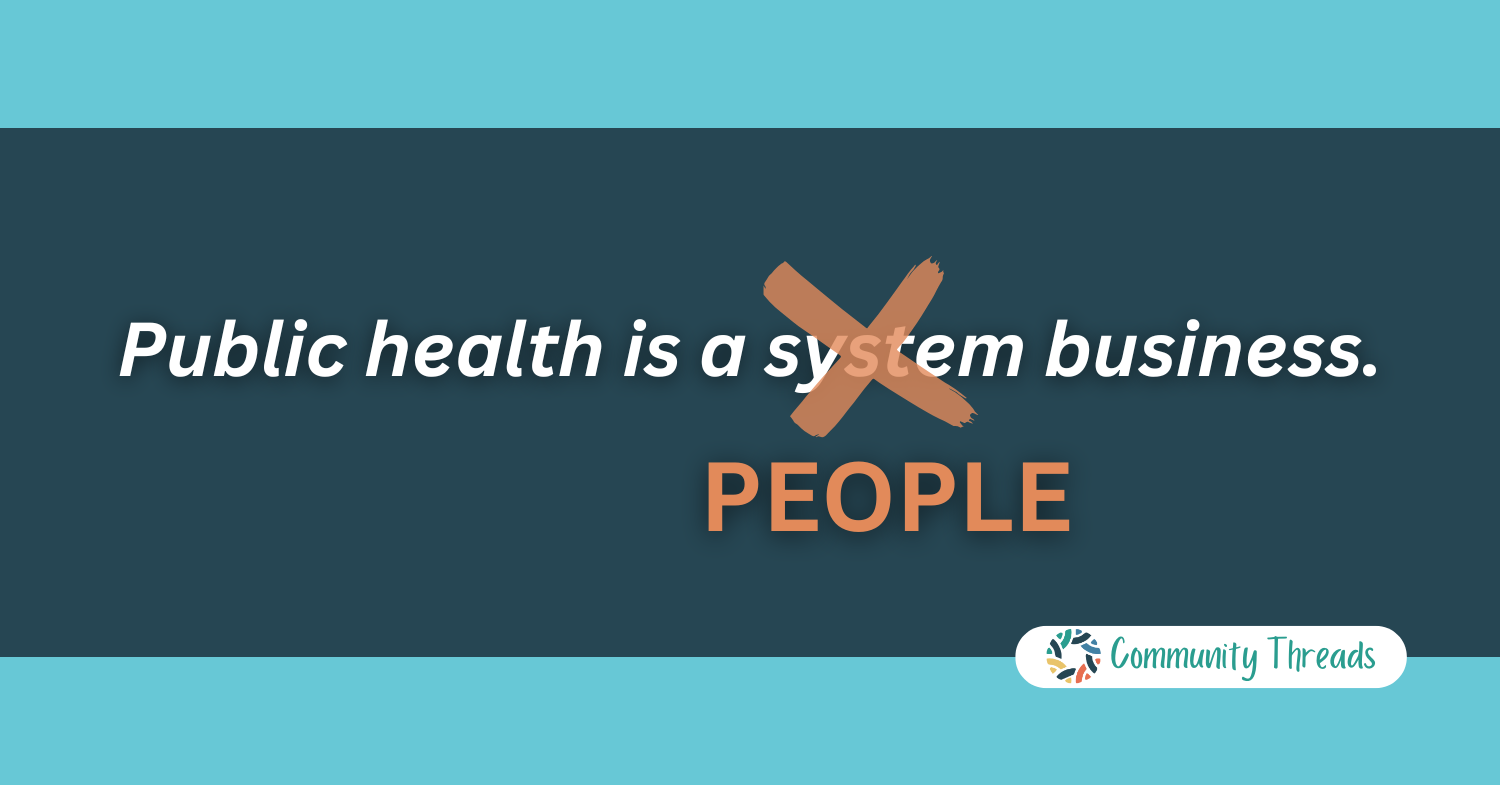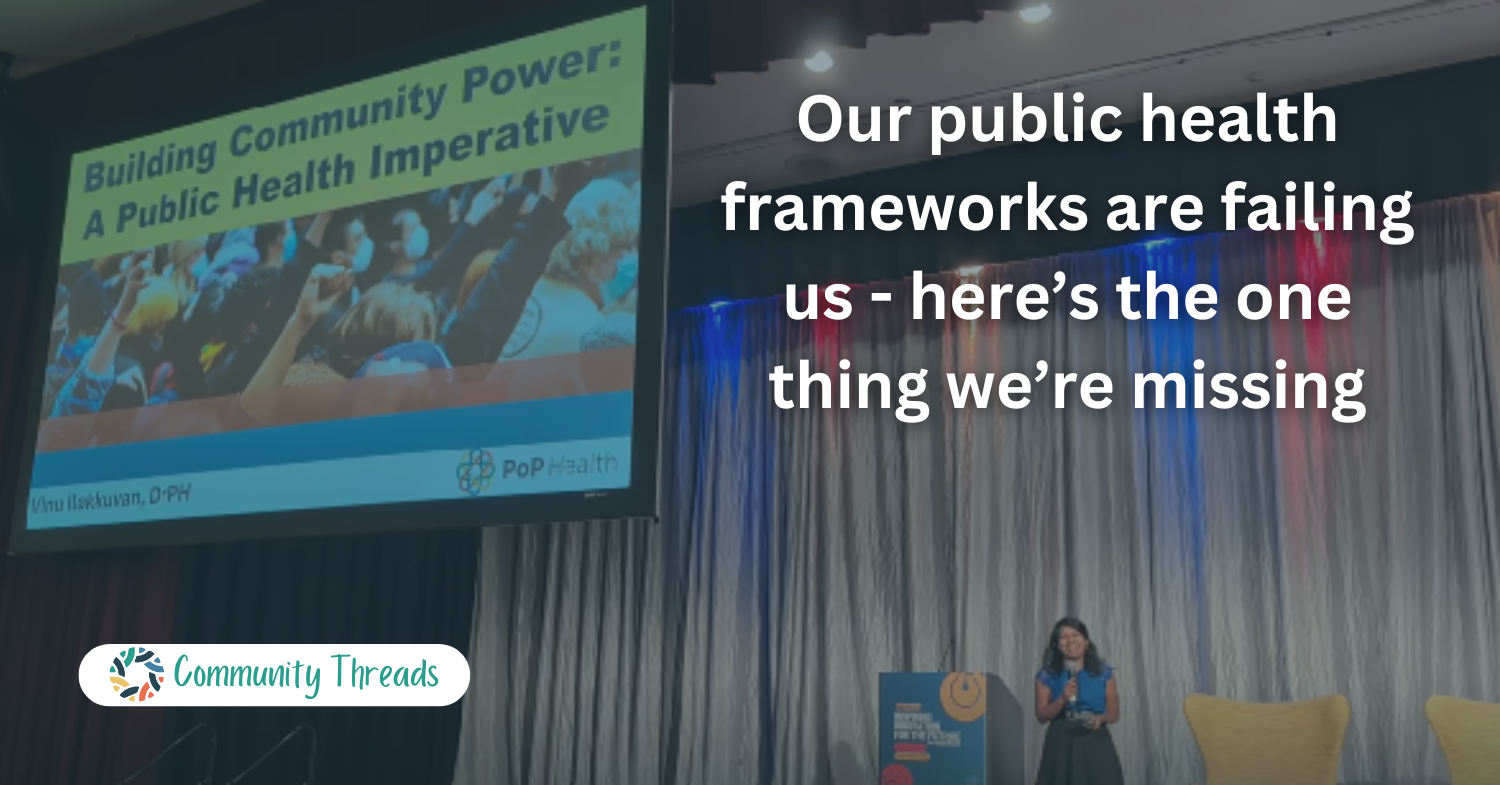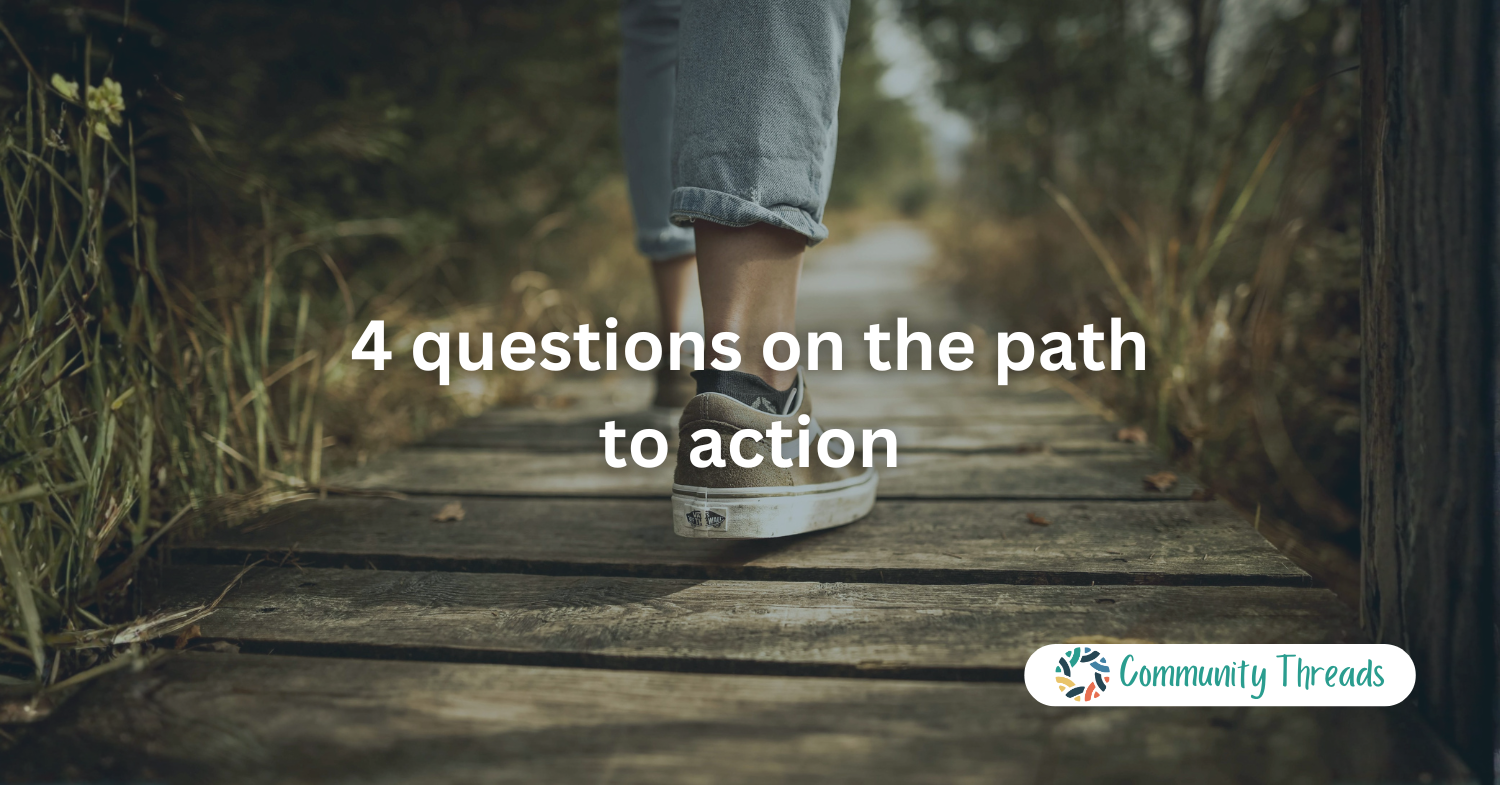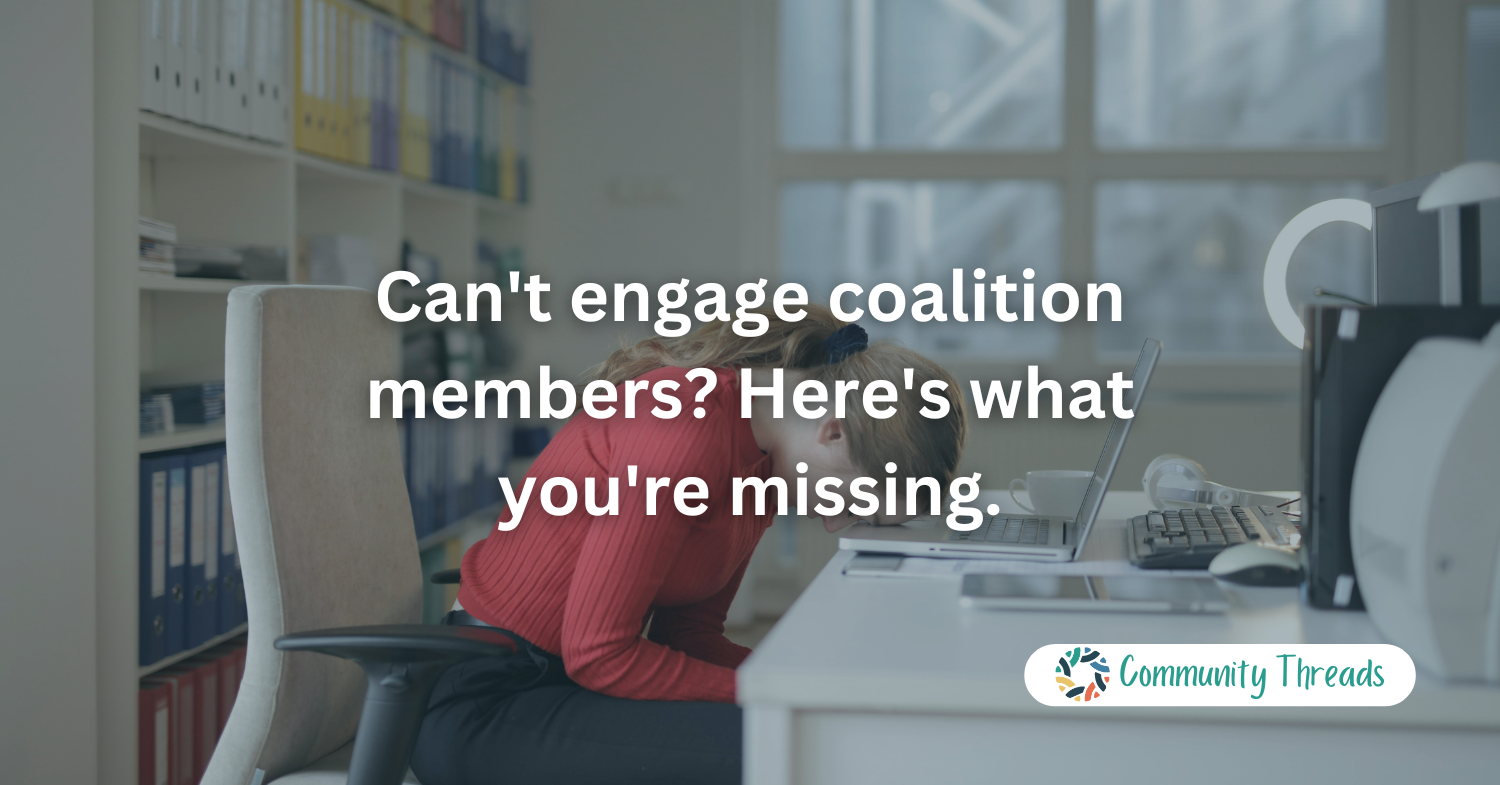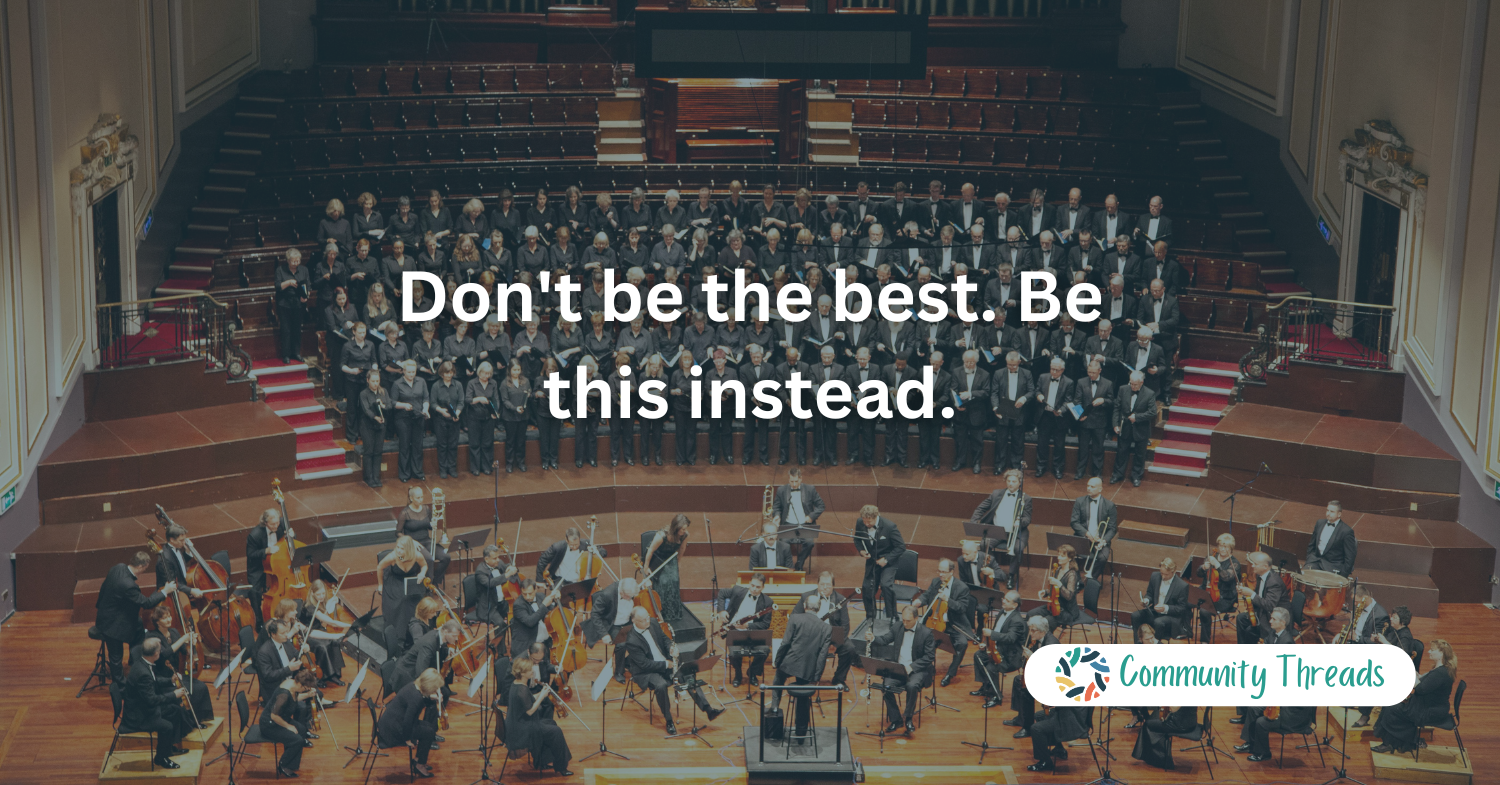
It all comes down to one thing: buy-in
Turns out the answer to everything isn’t 42. Or 6-7 for that matter (sorry, I couldn’t help myself!).
It’s BUY IN.
Turns out the answer to everything isn’t 42. Or 6-7 for that matter (sorry, I couldn’t help myself!).
It’s BUY IN.
Okay, maybe not the answer to everything but in the world of coalitions, it IS the answer to a lot of questions:
Q: How do we get more things done?
A: Buy-in.
Q: How do we get coalition members to participate meaningfully in our meetings?
A: Buy-in.
Q: How do we get local policymakers to make the changes our community needs?
A: Buy-in.
Q: How do we get new leadership to carry on the work we’ve started?
A: Buy-in.
Q: How do we get an organization’s staff to take action on the things our coalition has identified as helpful?
A: Buy-in.
As we noted earlier this month and as is the focus of this series, public health is a PEOPLE business. And for any of the work to move forward, PEOPLE have to be bought in to the work.
What people? It’s a long list: coalition members, local policymakers, community agencies and organizations (their leaders and their staff), community members themselves.
Which of these people really need to be bought in to a specific aspect of the work will vary based on their level of involvement and the stage of the work, but at some point, each of their buy-in will be important to advancing the work of your coalition.
So how do you get buy-in? Here are four steps to follow:
Whoever you need buy-in from, understand their ‘why’ - What do they most need and want? What motivates them and inspires them? What keeps them going? What keeps them up at night? What are their priorities and values? What metrics are they held accountable to?
Frame what you’re seeking in those terms - I’m not saying pander or change your goals (although sometimes, changing goals makes sense based on the input you get!). Rather, try to frame what you’re seeking in terms that align with their ‘why’ and understand what language to let go of and what language to amplify.
Bring them along for the ride - It’s hard to feel bought in to something if it’s been shaped without your input and now being forced on you. Understand who you need buy-in from and bring them along from the get-go. Involve them in shaping the work (This doesn’t mean you act on everything they say! But it’s important to hear them and be open to reshaping the work in ways that balance your ultimate goals and the needs and realities of those you need buy-in from to accomplish those goals).
Tell the story of how what you’re seeking is going to help them - How does what you’re seeking align with what they need and want, take something off their plate, help them achieve a goal, alleviate one of their pain points, or strengthen their impact?
Building buy-in is one of the most important roles of coalition leadership. I’d love to hear more about your experiences building buy-in. Whose buy in do you need that has been hardest to get? Is there a particular approach or conversation that has really worked for you in gaining buy-in? Drop me a note and let me know!
Sign up to receive future newsletters directly in your inbox at www.pophealthllc.com!
Public health isn't a systems business
It might not be something you’d expect me to say - me, someone who has drunk the “systems change” Kool-aid from way back in my undergrad engineering days throughout my public health training and into launching PoP Health (where our entire mission is to work with community coalitions to transform health through systems change).
Well, did that title catch you off guard?
It might not be something you’d expect me to say - me, someone who has drunk the “systems change” Kool-aid from way back in my undergrad engineering days throughout my public health training and into launching PoP Health (where our entire mission is to work with community coalitions to transform health through systems change).
But at a conference a few months ago, I heard someone say something that has really stuck with me because of how unexpected yet true it is: Public health is a people business cleverly disguised as a systems business.
Systems only move when PEOPLE move. So as leaders of community coalitions, we all need to build our PEOPLE strategy, not just our systems change strategy.
This is why we’re heading into 2026 with a new special series of Community Threads, focused on public health as a people business.
Because systems don’t change if people aren’t bought in.
Because systems don’t change if people aren’t champions for that change.
Because systems don’t change if we don’t plan for people moving into and out of leadership.
Because systems don’t change if we don’t treat people like people.
Because systems don’t change if we aren’t real with people.
We’ll be sharing more on each of these points over the next couple months. Please join the conversation, and forward this on to friends and colleagues - especially those who lead community coalitions! - who might be interested (if you got this email forwarded to you, you can subscribe to Community Threads here so you don’t miss getting this series straight to your inbox!).
What do you think? In what ways do you see public health as a people business? In what ways do you see public health as a systems business? Drop me a note and let me know!
Sign up to receive future newsletters directly in your inbox at www.pophealthllc.com!
Our public health frameworks are failing us - here’s the one thing we’re missing
Our public health frameworks are failing us.
They're true. AND they're failing us.
Let me explain why.
I had the pleasure of giving a Lightning Talk at the National Network of Public Health Institutes Open Forum conference in Pittsburgh earlier this month (it was a balm to the soul to be in the company of fellow community-based public health practitioners!)
Our public health frameworks are failing us.
They're true. AND they're failing us.
Let me explain why.
I had the pleasure of giving a Lightning Talk at the National Network of Public Health Institutes Open Forum conference in Pittsburgh earlier this month (it was a balm to the soul to be in the company of fellow community-based public health practitioners!)
Here’s how and why our public health frameworks are failing us, the one thing we're missing, and what we need instead:
Now, let me break down each of these ways to begin treating building community power as a public health imperative.
Way #1: Cultivating community connection
The status quo: What our former surgeon general Vivek Murthy calls a loneliness epidemic. We have an individualistic lens, an obsession with self-care and self-help.
What we need instead: A sense of COMMUNITY. Ways to work, play and simply be together. Third spaces to hang out. Mutual aid. Land use planning that prioritizes connections. Group care and group help. What Priya Parker calls Group Life.
An on the ground example (in Pittsburgh, where NNPHI's conference took place!) - Pittsburgh's wedding cookie table!
A public health example - community coalitions of course!
Ways to cultivate community connection in YOUR work: look for low-lift opportunities + think strategically about convening (What could you change if you teamed up with others that feels impossible alone? Bring folks together around a specific goal.)
Way #2: Strengthening the foundations for civic organizing
The status quo: Our civic muscles have atrophied. Direct involvement in local politics, union membership, and civic activity beyond voting have all declined.
What we need instead: Stronger foundations for civic organizing that can advance health-transforming policies. This requires: community connection as the foundation for effective organizing; strong local news to know what's happening and hold officials accountable; strong community organizing infrastructure
An on the ground example: Pittsburgh's "Our Water" Campaign, led by Pittsburgh United.
A public health example: The Public Health for Community Power Coalition (whose members include Health in Partnership (HIP), Public Health Institute, Prevention Institute, ChangeLab Solutions, Berkeley Media Studies Group, and others)
Ways to strengthen the foundations for civic organizing through YOUR work: For organizing/advocacy groups - long-term, consistent organizing across topics is key. For those with limits on direct advocacy - there's still so much you can do! Convene people and make intros across your government and community partners, and build storytelling and other skills among community members that make effective organizing more likely.
Way #3: Fostering narrative change
The status quo: Individualistic, "blame myself and shame on you" narratives about what shapes our health.
What we need instead: a narrative recognizing what lies further upstream and the role of community power. We need a new narrative – that gets explicit about the political and corporate forces shaping the policies and systems that shape our health. And then, beyond better messaging, we need actual narrative infrastructure to construct and sustain narratives over time, through things like community partnerships, research, legal advocacy, and institutions of meaning-making like schools, mass media, and museums.
An on the ground example: Healthy Start’s infant health equity coalition in Pittsburgh, who we here at PoP Health have been so grateful to work with over the years! They’ve crafted a community-driven narrative by funding local organizations to gather member stories, hosting town halls featuring community stories, and training community members as health advocates who speak to systemic issues.
A public health example: My new project, GASLIT (Gaslit by Corporations / Ignited by Community). I launched GASLIT to explicitly name corporate power as a root cause of public health harms and center community power in the fight for our health, planet, and future. Please sign up for the GASLIT newsletter if you’re interested in receiving action steps you and your neighbors can take to ignite change, stories of communities reclaiming their power, and investigations into corporate gaslighting.
The foundations for fostering narrative change in YOUR work: Think about the narrative itself: Revisit how you talk about root causes of health. Are you going upstream enough? And build narrative infrastructure: Build community members' skills to tell their stories, create spaces for them to speak directly to decisionmakers. Engage with institutions of meaning-making to shape narratives about health.
So, what's next?
Which of these ways fits in most directly with your work?
What steps are you hoping to take next?
Drop me a line and let me know.
And if I can help, whether that's through a keynote talk on community power as a public health imperative; training, tools, and coaching for your coalition, or simply answering a question via email, please reach out!
Sign up to receive future newsletters directly in your inbox at www.pophealthllc.com!
4 questions on the path to action
I’ve been sitting with some hard truths lately.
Systems are complex. Dynamic. Interconnected.
Working together in a coalition to change those systems is hard. Slow. Complicated.
That’s just the reality of what we’re trying to do.
I’ve been sitting with some hard truths lately.
Systems are complex. Dynamic. Interconnected.
Working together in a coalition to change those systems is hard. Slow. Complicated.
That’s just the reality of what we’re trying to do.
So for anyone else who’s feeling stuck, but not ready to give up (I’m definitely not!) - I thought I’d share some simple questions I go back to when I’m trying to dig myself out of the ditch and get us back on a path to action. (And let me be clear, I mean the questions are simple - the process of answering them and the answers themselves are unlikely to be.)
For whatever system you’re trying to change:
What's working? What are the strategies, models, and examples that are working that we can learn from?
What’s not working? What are the gaps, challenges, and complaints we need to address?
What should be tried next? What specifically should be continued or started, changed or stopped?
Who has the authority/capacity/expertise to execute those next steps? And what might we or our partners or our communities be able to do to influence, equip, or support those people to take those steps?
I hope these questions can help you climb back onto the path to action if you’ve fallen off, or keep you going on it if you’re still making your way.
And if you're looking for some extra support on that front, we're here to help! PoP Health's capacity building packages for community coalitions and their partners include training workshops, tools, and templates that will help you walk through the systems change questions I've shared above in a way that's driven by both community and coalition member perspectives. Plus, we'll support you with ongoing coaching and technical assistance that'll make sure you take those actions to the finish line. Here’s a brief summary, email me if you want to chat further!
Sign up to receive future newsletters directly in your inbox at www.pophealthllc.com!
Go ahead, reinvent the wheel - just do it faster
When you hear the phrase “reinventing the wheel”, how does it make you feel? I’ve always thought of it as a bad thing, something to be avoided, a sign that I’m doing things wrong.
When you hear the phrase “reinventing the wheel”, how does it make you feel? I’ve always thought of it as a bad thing, something to be avoided, a sign that I’m doing things wrong.
In my work with coalitions, I’ve talked about the need to avoid reinventing the wheel - after all, why waste time and resources reinventing something that already exists, that someone’s already figured out?
So imagine my surprise in a recent meeting with a school mental health coalition I work with when one of the members said that avoiding reinventing the wheel shouldn’t be a goal, can’t be a goal, that it’s not possible. That instead, we should focus on creating systems and processes that allow reinvention of the wheel to happen faster, so we waste fewer time and resources.
My mind was blown.
Because, I realized, he was right.
When a school or organization gets new leadership, they might reinvent the wheel because it’s the only way they’ll be fully bought in to the solution, with a stronger understanding and belief in what needs to be done and why. Or maybe the wheel was developed a while ago and needs updating for the current context. Or maybe it was created for a different community and needs to be adapted to ours.
So there are actually a few different reasons why reinventing the wheel might not be an entirely bad thing. Plus, it’s kind of human nature, so maybe it's more effective and realistic to assume it will happen but do what we can to speed up the process.
So how can we make the inevitable reinventing of the wheel that will happen faster?
Internal documentation: document your coalition’s strategy, process, pivots, actions, accomplishments, challenges, outcomes, membership, partners - not just in a mass of disorganized files (I’ve totally been guilty of that before!) but in a running document with summaries and takeaways (and hyperlinks to key files), as if you were onboarding someone.
“Spark notes” on the larger system: whether your coalition is working on school mental health or some other topic or health broadly, you’ll want to summarize key information on the relevant system(s) within your community. What’s working (e.g., models, strategies, examples), what’s not (e.g., key gaps and challenges, including with respect to policies, funding, coordination, etc.), and the key agencies, organizations, policymakers, and others in your community who are involved in the system.
Process to update these regularly: of course, most coalition work is long term and both your coalition and its work and the larger system are ever changing. So you’ll want to establish some kind of process to update the internal documentation and “spark notes” on the larger system at a regular cadence, ideally in a relatively low-lift way.
So, are you on team “go ahead, reinvent the wheel - just do it faster!” or are you on team “avoid reinventing the wheel at all costs, we don’t have time for that!”? And are there other strategies you’ve seen work to make the work of reinvention go faster? Send me a reply and share your thoughts!
Sign up to receive future newsletters directly in your inbox at www.pophealthllc.com!
Can't engage coalition members? Here's what you're missing.
Do you feel like attendance at your coalition meetings is dwindling, or that everyone’s logging onto Zoom but multitasking during the meeting? Or maybe folks are showing up and engaged, but it feels like pulling teeth to get anyone to provide input or take action between meetings?
Do you feel like attendance at your coalition meetings is dwindling, or that everyone’s logging onto Zoom but multitasking during the meeting? Or maybe folks are showing up and engaged, but it feels like pulling teeth to get anyone to provide input or take action between meetings?
If you’re having troubling engaging coalition members, there’s likely one thing you’re missing. SPECIFICITY.
Specificity shows up in a number of different ways in coalition work. Here are some ways to get more specific:
Make sure your members each have a clear, specific role: Collaboration doesn’t mean everyone does everything. You’re going to have trouble both getting and keeping a member in your coalition if they don’t see a clear role for themselves. People’s time is limited and valuable, and coalition membership is often on a volunteer basis, something taken on in addition to a person’s day-to-day job responsibilities. If they feel that their absence from the coalition isn’t going to have an impact, they will not care to join or stay. When you ask someone to join the coalition, make sure you talk together to specify their exact value-add and responsibilities, and why they are uniquely suited for it.
Make sure your coalition has a clear, specific role: If your members aren’t clear on what value the coalition is adding to your community, they aren’t going to be engaged. You can’t (effectively) be everything to everyone, so niche down, both in terms of what your coalition is offering to your community and who within your community you’re aiming to reach. As we often hear in the consulting world, there are “riches in the niches.” When you “niche down” and narrow both your offer and your audience, your value as a coalition becomes crystal clear. And that’s going to keep your members excited and engaged.
Foster specific collaborations for specific purposes: A leader of a coalition we work with recently reached out to me for some advice on how to better engage their health system partners, who had stopped showing up to meetings and contributing their ideas. I suggested they consider if there are specific healthcare/community organization collaborations that can be designed and implemented via the coalition - if we ask X healthcare system to work with Y community organization to partner on Z activity (that's mutually beneficial to both organizations), then they have a reason to show up and stay engaged. If we're not taking action, there's no reason for them to show up. If we're taking action but it's very broad and vague (i.e., "we want to strengthen collaboration between healthcare and community organizations"), they don't really see why they/their health system SPECIFICALLY matters or needs to show up.
Get specific about what capacity and connections you’re building for coalition members and in the community more broadly: What do coalition members gain from participating in the coalition? Are you going to offer ways for them to build their capacity in a particular area like evaluation? Coalitions often serve as a connector and convener, both for coalition members and the community writ large - but exactly what kinds of connections are you building and to what end? Are you going to offer ways for policy and advocacy organizations to connect with community members to inform their priorities?
What do you think? How else can we get specific in what we do, how we do it, and who we do it for? Drop me a line and let me know!
Sign up to receive future newsletters directly in your inbox at www.pophealthllc.com!
Don't be the best. Be this instead.
Our family spent the last week at an all-family violin camp in the Blue Ridge mountains, and it brought us some much needed peace, joy, and community in these tumultuous times.
Our family spent the last week at an all-family violin camp in the Blue Ridge mountains, and it brought us some much needed peace, joy, and community in these tumultuous times.
It was our 8 year old's first time playing in an orchestra (the beginning orchestra teacher introduced them to "Monsieur Baton", and all kinds of antics ensued, with the kids learning many lessons about following the conductor and playing together without even realizing it).
It really made me think about something our daughters' violin teacher said in a group class last month, as she was teaching these little kiddos to play in an ensemble - "It's not look at me, I play the loudest, look at me, I play the best, it's look at us, we play together."
Look at us, we play together.
How powerful, how beautiful, how RIGHT.
This is how I want you to think about your coalitions.
As any one organization or member of your coalition, the goal is not to be the best.
Instead, embrace your interdependence and engage in collective action.
In a world that values independence and finishing first, this is where the value of a coalition lies: interdependence and collective action.
It goes beyond simply being together to playing together.
It’s not just convening partners on a regular basis to share information - it’s planning and taking intentional, strategic, collective ACTION. We spend half our meeting providing updates (peak “this could have been an email” vibes, right?). Instead, let’s think about what infrastructure we can jointly build for meaningfully aligning work across organizations.
It’s not just having multisector partners around the table - it’s actually working across sectors. We keep doing what we’ve always done in our own siloes. Instead, let’s consider how to finance the work of our coalition and work in our communities in ways that allow for integrated and sustainable action. Let’s consider the power dynamics at play within our coalition and the broader community so we can shift power and transform oppressive systems that underlie all our sectors.
And let’s do it all with joy and music and community.
What are your plans for joy and music and community this summer? Whether it’s coalition work or your own summer vacation, I want to hear about it! Drop me a note.
Sign up to receive future newsletters directly in your inbox at www.pophealthllc.com!
The 1 person you're missing at your coalition table
Maybe I've worked with your coalition directly and maybe I haven't and maybe we haven't even met -- whichever group you are, I know someone you are most likely missing at your coalition table: a local historian.
Maybe I've worked with your coalition directly and maybe I haven't and maybe we haven't even met -- whichever group you are, I know someone you are most likely missing at your coalition table: a local historian.
Here’s the thing -- none of us can do work in our communities effectively without being grounded in our communities. And understanding local history is a big part of that.
I have the fortune this year of being part of the Seeding Disruption fellowship in DC through my work on school mental health in the city. And our very first set of readings and discussions last month were a deep dive into DC history -- from the Native American communities that first lived here to redlining to the fights over desegregating city swimming pools to the stories of specific high schools. What struck me most in reading all this history (for the first time, I might add) is that the history of DC feels like a tale of divisions: between black/brown and white, between native DC residents and transplants, between communities “below the river” and “above the river”, between local and federal, between public schools and charter schools. These divisions still show up in DC today and shape our work in a myriad of ways. How can we do our work effectively without being grounded in this?
One of our facilitators made a joke at one point in the conversation, noting that given the number of folks in the room who worked in and with DC schools, certainly we’d heard this history before. Everyone looked around the room at each other like, “Um, that’s a joke, right?” And sadly, yes, it was a joke. But it shouldn’t be!
An understanding of local history ought to be part and parcel of training and professional development at any community-facing organization and a local historian ought to be a permanent fixture on any community coalition, health focused or otherwise.
In some of our work in DC, we've seen DC public schools add to their New Educator Orientation a local history focused set of outings and conversations, which is a powerful way to ground those new to your area in a sense of place, history, and community.
And having a local historian at your community coalition table is a powerful way to make sure that your plans and actions are not disregarding the history of your community or failing to learn from that history.
So, if you don’t have a historian on your coalition -- what are your next steps?
And if you do have one -- you’re one of few, so please tell me everything! How did a local historian come to be on your coalition, what do they bring to your conversations, and what can we learn from your experiences? Hit reply and let me know.
Sign up to receive future newsletters directly in your inbox at www.pophealthllc.com!
4 ways to center humanity in your work
Our political and business leaders may be failing to center humanity right now, but that doesn’t mean we should too - in fact, I think that means we should be even more intentional about centering humanity.
Our political and business leaders may be failing to center humanity right now, but that doesn’t mean we should too - in fact, I think that means we should be even more intentional about centering humanity.
Our work is in community, where we are striving to advance health and well-being. To do this, we have to intentionally, explicitly center humanity in a world where political and technological headwinds are working against us.
How do we do this? Here are some ideas:
In your coalition meetings, take the time for an icebreaker or two, both meaningful and silly, that allow people to actually get to know each other on a deeper level. Here’s the most powerful icebreaker question I’ve come across. At a coalition meeting just yesterday, we asked folks what they’re working on right now that they’re most excited about, and it led to some wonderful conversations. And at a meeting I was at last week, they posed a series of questions and had us move to four corners of the room based on whether we agreed or disagreed (see here for more on this technique). We talked in our small groups about why we landed where we did and then shared with the other groups too, widening our perspectives (and sometimes even changing our minds).
In sharing stories and data with your community, make it specific to THEIR school, neighborhood, workplace, etc. This has come up a lot in my work in school mental health - both for those who work in schools and families of students, information is most relevant and engaging if it is specific to their school. Taking the time to parse out the data and highlight stories that are school-specific pays off in spades when those you are trying to reach actually pay attention to what you’re sharing and are motivated to take action based on it.
In the way you talk about systems and technology/AI with your community, recognize that it is the choices of humans in power, in corporations, in programming technology that create the systems and technology/AI we have. Sometimes we discuss these things as if they are born into existence on their own, rather than shaped and created by human beings.
In terms of the end goals you are working towards, know that humans need and thrive on social connections and community and in terms of how you work, know that trust and relationships are paramount.
Do these ideas resonate? Where do you feel like your coalition, organization, or even just you, as an individual, are succeeding in centering humanity, and where are you struggling? Drop me a reply and let me know!
Sign up to receive future newsletters directly in your inbox at www.pophealthllc.com!
Find your low-lift solutions
Growing up, were you, like me, always told to work hard?
It’s advice I’ve come to question over the years.
Don’t get me wrong, I still have deep respect for a strong work ethic. I just wonder if we’ve gotten overly obsessed with the idea of working hard instead of working strategically, smartly, efficiently. Which sometimes means the work is actually…easier. Faster. More fun.
Growing up, were you, like me, always told to work hard?
It’s advice I’ve come to question over the years.
Don’t get me wrong, I still have deep respect for a strong work ethic. I just wonder if we’ve gotten overly obsessed with the idea of working hard instead of working strategically, smartly, efficiently. Which sometimes means the work is actually…easier. Faster. More fun.
Let me give you an example, courtesy of our school PTA.
Last week, as I was running into my daughter’s school to drop off her picture day order form (which I forgot to put in her backpack that morning, oops!), I saw a flyer for movie night at the school that very night. I had totally forgotten about it, but once reminded, quickly scanned the QR code and got tickets.
The PTA holds these on a few weeknights during the school year, and we’ve been trying to go whenever we can. When you buy tickets, you get to vote for one of the three options (my daughters LOVE this opportunity to chime in with their preference), and the one with the most votes gets screened. Tickets are $2 to see the movie, $7 if you also want a slice of pizza, snacks, and drink. Proceeds go to support the school. They screen the movie on the projector or wall in the school gym or cafeteria and everyone brings blankets/fold up chairs/pillows to throw on the floor.
The kids love the chance to see their friends, see a movie, and eat pizza. As parents, we love the chance to see other parents, observe the dynamics our kids have with their friends, and just have an easy, close-to-home, fun family activity. For the PTA, these events help raise funds but require relatively little effort or cost - the school is there, the gym/cafeteria/parking lot are empty in the evening, there’s already a projector and sound system ready to go.
Win-win-win.
And no one - not the kids, not the families, not the PTA - has to work hard.
I think these kinds of low-lift solutions are magical.
The reality is that the best way to get more participation is to make things easier for everyone involved. This isn’t always possible - but when it is…pure magic.
Community members are more likely to show up if it’s easy for them. Coalition members or local organizations are more likely to keep organizing or running an activity or program if it doesn’t require too much of them and the impact feels more than worth the little bit of effort required.
So take a look around - are there low-lift opportunities for community connection or action that your coalition can put into place? Drop me a note and share your low-lift examples, whether you’ve already done them/experienced them or are planning them for the future!
Sign up to receive future newsletters directly in your inbox at www.pophealthllc.com!

